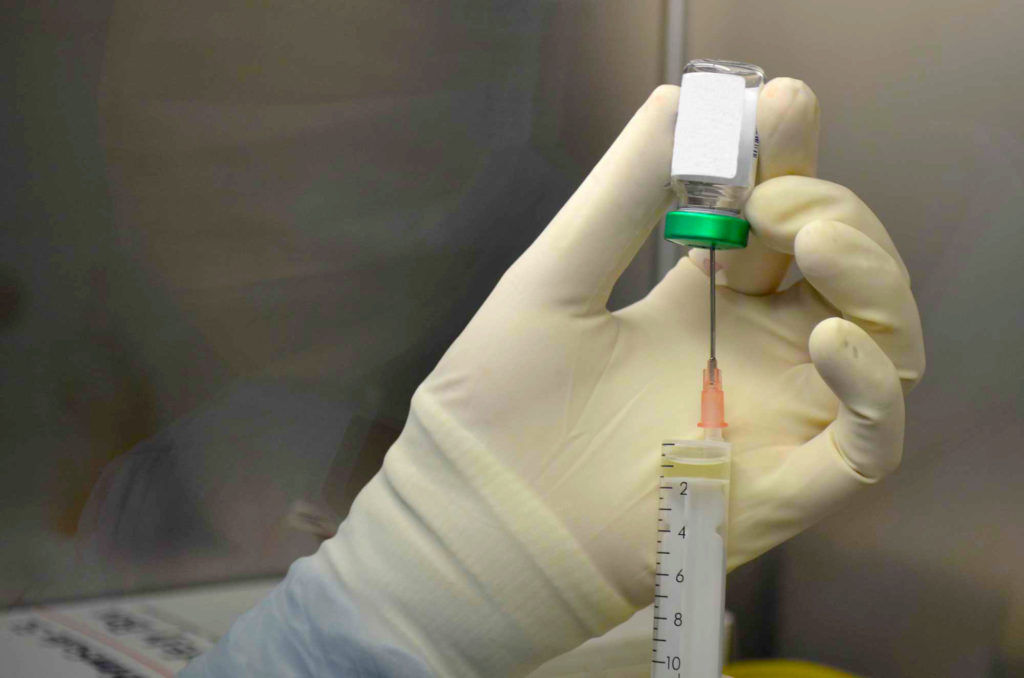Cancer in Gaza: How Anera Meets Critical Needs
Posted in: Voices from the field
Cancer is one of the deadliest diseases affecting humankind. Sadly, cancer is deadlier in some places than in others, due to a lack of medication, inhibited access to the latest treatment protocols, prohibitively expensive treatment costs, restricted access to care, late-stage disease diagnoses, an inadequate number of oncologists, etc. All of these challenges are present in Gaza.
The Gaza Strip is exactly that, a strip of land 51 kilometers long and 11 kilometers wide. Population density is high, with nearly two million people in 561 square kilometers of space. Cancer is the second leading cause of death in Gaza, according to the Palestinian Ministry of Health, accounting for 14 percent of all deaths. Between 2011 and 2016, there were 8,515 cases of cancer registered with the Ministry. In 2016, the incidence rate of cancer was 89 cases per every 100,000 people. The most common forms of cancer in Gaza are breast, colon, blood, lung, lymph node, thyroid, brain, prostate, bladder, and stomach.
Breast cancer comprises about 32 percent of cancer cases in female Gazan patients. When I was writing my master’s thesis in 2014, I found that the five-year survival rate for breast cancer patients in Gaza, regardless of stage or grade, was an abysmal 53.4 percent. That number thankfully climbed to 65 percent in 2018. However, comparatively, the five-year survival rate for breast cancer in the US in 2018 was 90 percent — a stark difference.
A proposal provided to Anera’s Gaza staff by Shifa Hospital reported that 60 percent of women in Gaza who are diagnosed with breast cancer are in a late-stage by the time of diagnosis, and that the cancer has usually metastasized to other parts of the body at the time of diagnosis. The biggest challenge affecting early detection of breast cancer is a general lack of knowledge on self-testing for breast cancer. Furthermore, cultural norms occasionally clash with recommended screening practices.
Even before diagnosis, the biggest issue Gazan cancer patients face is access to proper treatment. The health care system in Gaza is chronically stretched thin due to a lack of medicines, medical equipment and professionals, and recurrent surges in trauma cases resulting from violent reactions from Israeli security forces. Cancer treatment is often the most challenging form of medical care to provide during these crises. Throughout 2018, essential cancer medications never surpassed more than one-month’s supply, and cancer patients in Gaza are in constant fear that their medicines will run out mid-treatment.


Hospitals and clinics often lack the medical equipment necessary to diagnose and treat cancer patients, so they are typically referred to other facilities in the West Bank, Jerusalem, and Israel. Even with these referrals, in 2018, “39 percent of patient applications for permits to exit Gaza for health care were unsuccessful.”
WHO reported that from January to August 2019 there were 16,542 permit applications for patients in Gaza to access vital health care elsewhere. Of these, 30 percent, or 5,003 people, were oncology patients. Among these, 80 percent (4,015) were approved, while 17 percent (844) were delayed and 3 percent (144) were denied outright.
Most patients reapply for permits after the initial rejection, and some do eventually get them, but many others do not, even after multiple attempts. Because of these challenges, tragically, Gazans end up dying from potentially treatable cancer or related health issues. This process is lengthy, unpredictable, and lacks transparency, which incurs additional financial burdens and emotional stress on cancer patients in Gaza.
The restriction on movement, as described above, affects Gaza in long-term, indirect ways as well. The inability to exit Gaza limits the professional development of health professionals and poses a major barrier to the cohesiveness of the health system across Gaza. The health care system in Gaza will never develop the capacity to treat cancer patients if its professionals cannot leave to learn about current practices. Restrictions on the importation of medical devices also stifle Gaza’s health care system.
Anera recognizes the struggles of Gazan cancer patients and is working closely with our in-kind partners to procure critical medications for the fight against cancer. Anera procured two shipments of critical cancer medicines from Americares and International Health Partners. And we are at work processing another.
How you can help.
Continuous, reliable sources of cancer medications are essential for ensuring that Gazans are able to complete their full cycle of treatment and have the possibility for entering remission. Your support will mean a higher quality of life and stability for not only cancer patients but their families. Please join Anera in helping these disadvantaged cancer patients get proper treatment.
With your support, we can work toward diminishing the mortality rate due to cancer in Gaza.
Lana Al-Qedwa is Anera’s public health officer in Gaza.
